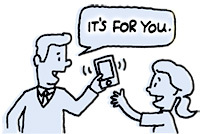You know what? There’s too much stuff. That might not be what you’d expect, coming from a technology editor. But looking back over the past year, I found myself wading through tons of gadgets, tools, and miscellaneous merch to get to the real goods, and by that I mean the substantive ideas that we wrote, talked, blogged, and tweeted about in 2011.
 If the passing of Steve Jobs tells us anything, it’s that imagination trumps all. Beyond the widespread praise for our beloved i-gadgets and Apple’s unprecedented dollars-and-cents success, there was, simply, admiration for a creative mind, which inspired people. Jobs, it should be said, was far from a perfect person—known for his rough treatment of those around him and under whose watch Apple has been cited for poor labor practices in China. But in the end, it’s the example of daring ideas and not the technological marvels in and of themselves that resonates with us.
If the passing of Steve Jobs tells us anything, it’s that imagination trumps all. Beyond the widespread praise for our beloved i-gadgets and Apple’s unprecedented dollars-and-cents success, there was, simply, admiration for a creative mind, which inspired people. Jobs, it should be said, was far from a perfect person—known for his rough treatment of those around him and under whose watch Apple has been cited for poor labor practices in China. But in the end, it’s the example of daring ideas and not the technological marvels in and of themselves that resonates with us.
So my picks aren’t so much about products, things you should run out and buy, but rather the overarching concepts that’ll potentially shape and be shaped by our collective imagination. From technology’s capacity to open doors for differently abled users to the digital divide’s troubling inequities to the evolution of books and reading, we’re all challenged to think differently. Given a wobbly economy and the inflexibility of our institutions, notably schools, this is hard. But perhaps we, too, can count ourselves among the crazy ones, as Jobs called them, who change the world—at least our little corner of it.
1. Ingenuity

We’ve seen plenty of innovations lately—after all, that’s what tech is about. From Sifteo game cubes to the Lytro camera, 2011 saw some astonishing category shifters. But no less remarkable is human ingenuity. It takes guts to forge ahead in the great digital transition, especially when the path isn’t at all clear. So many of you, for example, are blazing the trail by embracing ebooks—while at the same time integrating print. Still others, undaunted by zero funding for materials, are exploring digital tools to help kids create their own econtent. Our faith’s in you, ninjas of change. So to 2012, we say, bring it.

2. The changing face of reading
“We’re not into digital, we prefer real books” is a refrain we still hear. Whether you cheer or scoff at that notion, the fact is, we’re all struggling to reconcile our personal experience of print. It’s time to focus the conversation on the act of reading itself. With multiple platforms about to set linear narrative on its head, we’ve got bigger fish to fry than a nostalgia for wood-pulp pages.

3. Curation
It bears repeating: there’s a lot of stuff out there. Hence the call for curation, which is more than a passing buzzword: it’s a core role that information specialists of every stripe must assume if they’re to survive in an age of info overabundance. For SLJ blogger and teacher librarian Joyce Valenza, curation is also an essential skill that should be instilled in young learners, as well as the inspiration for a song.

4. Tablets
“It’s hard to put into words, but there’s something fundamentally different about [the tablet],” said Wall Street Journal columnist Walt Mossberg at the Consumer Electronics Show back in January. “It’s immersive. It’s different than paper, and it’s different than a laptop, it’s its own thing. And it has a lot of traction with people.” Now we’re sizing up the latest challenger to the iPad’s dominance in the market, the Kindle Fire, which has raised concern about privacy and the Amazon ecosystem. Stay tuned.

5. Accessibility
Notable tech advances have enabled more people to have greater access and also raised awareness of a fuller spectrum of users. Ira Socol, a special education technology scholar at Michigan State University’s College of Education, shared some of his favorite innovations. In addition to enhanced text-to-speech functionality on iOS devices, he likes Balabolka, a free text-to-speech program that converts books into MP3 audio files, and the MITS Freedom Stick, for taking accessibility software on the go.

6. Social media and change
We’ve seen the Arab Spring bring sweeping changes to the Middle East, powered in no small part by Twitter, Facebook, and YouTube. Stateside, these social media tools have galvanized educators, especially in Wisconsin and Missouri. But schools have yet to experience a real revolution. Tom Whitby, founder of the Educator’s PLN (personal learning network), says that educators are sharing on Twitter, “but not yet in great numbers.”

7. Hardcore tech skills
Digital natives love Facebook and the iPad. But are they learning to understand these tools and their biases? And what about acquiring the skills to create great technology of their own? Enter CodeNow, a nonprofit organization that’s introducing underserved kids to the basics of computer science and programming. After launching free workshops in Washington, DC, last summer, CodeNow plans to reach youth in four cities next year.

8. Mobile
We see the future, and it’s mobile. Facilitating just-in-time search and sharing, and augmented reality to boot, mobile devices are altering the very context of learning. But realizing the true power of mobile computing goes beyond smartphone adoption. As New York English teacher Paul Allison cautioned at the October Dell Education Think Tank, “Kids are using their own devices. But what are they doing on them?”

9. Start-up culture
Entrepreneurial ventures abound. Citizen wildlife sightings become a global social experience in one startup we covered, Project Noah. Then there’s Hoot.Me, which lets students set up study sessions on Facebook. For a fresh take on classic lit, Newquill lets users import audio, video, graphics, and translation tools into existing ePub documents. Story apps are arriving on the scene daily, as are developers. We wonder how much pedagogical thought enters the workflow here.

10. The digital divide
According to a recent study, only 27 percent of kids from poor families have access to smartphones compared to 57 percent of their more affluent peers. For media expert Henry Jenkins, the issue isn’t access to technology, it’s the lack of access to skills, knowledge, and experiences. Speaking at the 2011 Mobility Shifts conference, he underscored the important role of schools in closing the participation gap, adding, “If we don’t bring this into the public libraries, we’re in trouble.”
And what resonated with you in 2011? We’d love to hear.



Thanks for the insightful analysis, Kathy! As the New Year is upon us, Neal and I were musing about whether the changes we will see in our lifetime will match those of our parents who witnessed the advent of household refrigerators, microwave ovens, cheap air travel, the Internet, and Skype, to name just a few innovations. Your article captures some of the key trends that characterize the innovations of our generation.